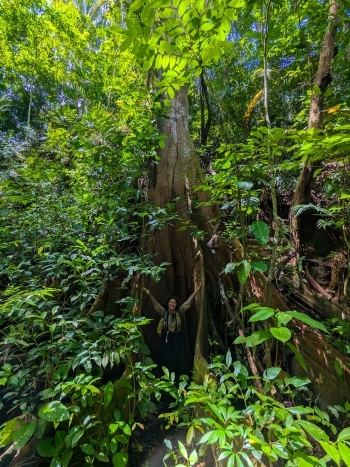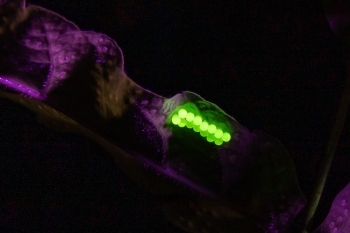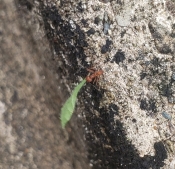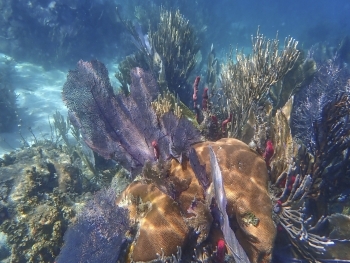School of Life Sciences offers opportunities to study in Panama, Belize
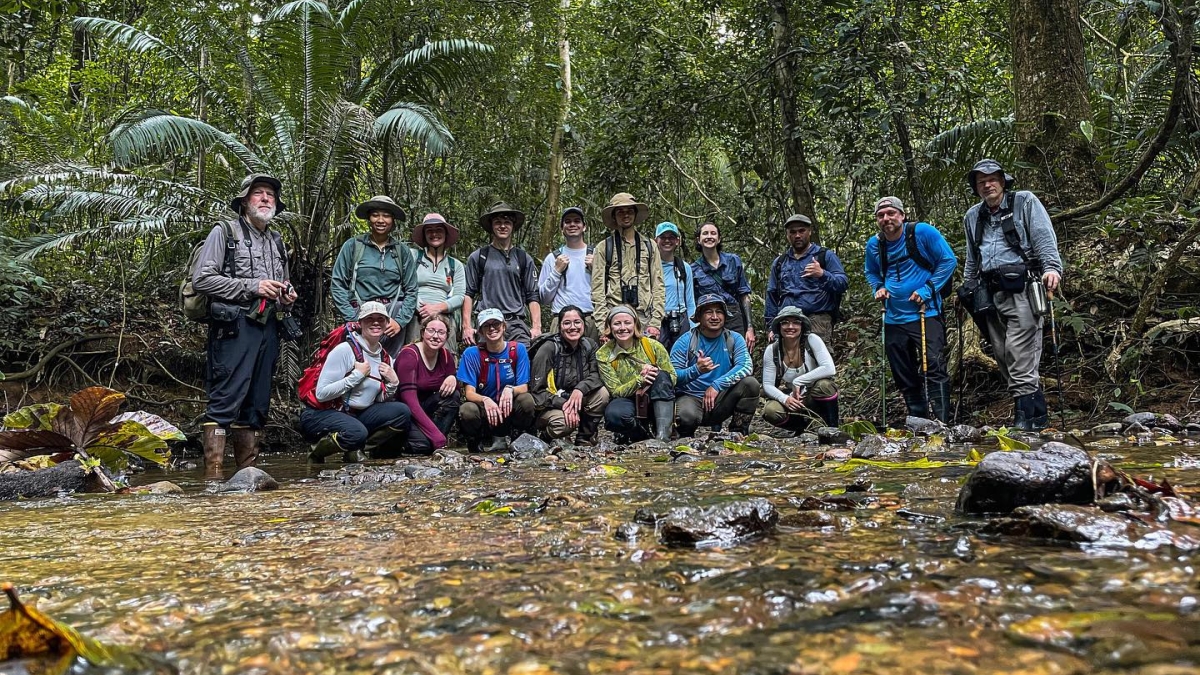
Students with Professors Pierre Deviche (far left) and Juergen Liebig (far right) in the rainforest in Panama, July 2023. Photo courtesy Ilsa Rodriguez
As an ASU Online student studying computational life sciences, Ilsa Rodriguez had never participated in a hands-on research experience. Then, last summer, she traveled to Panama to take a study abroad course, BIO 494: Tropical Biological Research, and fell in love.
“The trip really gave me a great introduction to what research is,” Rodriguez said, “and it really opened my eyes, and I had the realization that ‘Wow, this is something I really could see myself doing as a career,’ you know?”
The nearly two-week-long course — which is being offered by the School of Life Sciences again this year, with an application deadline of March 1 — combines lectures, hikes and natural and cultural excursions within Panama.
In the Gamboa field station, managed by the Smithsonian Institute, Rodriguez and other students worked individually, coming up with unique research questions, on which they based their own projects. For many, it was their first experience with a hands-on research project.
Rodriguez’s project focused on the fluorescent organisms found in the Panamanian rainforest. She explored the organic components that make up fluorescent versus bioluminescent organisms and how fluorescent organisms are helpful to the environment’s trees and bugs.
“It's believed or theorized that fluorescent organisms were found to help with mating and things like that. As humans, we can't see it with our eyes, but the insects can see it on each other, and the brighter they are, the more inclined they are to want to mate with each other or, alternatively, it can be a warning signal like, ‘Hey, I’m poisonous,’” Rodriguez explained.
As for the trees, she added, it is theorized that the lichen act as a sunscreen for them. “The sun beats down pretty heavily on the trees in the Panamanian rainforest, and the lichen that grows on them is fluorescent and acts as a way to preserve the moisture inside of them.”
Although each student worked on their own project, “we still helped each other out when we could,” says Mariana Bustamante, who also took the course last summer. “I would talk to one of my classmates about my idea, and she would help me build from that, and I would help her build on her idea. Being an online student who also lives out of the United States, I've never had that type of experience. I loved working as a team even though we were doing individual work. It was a lot of fun; I enjoyed it.”
Bustamante studied leaf-cutter ants, also known as carpenter ants, which are known to forage for leaves and bring them back to their nest.
“It turns out that the reason why they cut and carry leaves is because they have a mutualistic relationship with the fungi that lives inside their nest,” Bustamante said. “They feed the fungi these leaves, and then the fungi in turn produces food for the ants.”
While the course is “like a research boot camp,” according to Rodriguez, the students also get to immerse themselves in Panamanian culture by visiting an Indigenous Embera village, a cloud forest and the colonial Old Quarter of Panama City.
This year’s course will take place in June and will be led by Professor Jon Harrison, Professor Pierre Deviche and PhD student and teaching assistant Tyler Murdock.
The course fee is $4,985, which includes housing, transportation, meals, fees for activities and excursions, ASU faculty support and international health insurance. The application deadline is March 1.
Reefs and rainforests in Belize
The School of Life Sciences is also offering a brand-new study abroad course this May: Conservation of Tropical Reefs and Rainforests in Belize, directed by Associate Professor Juergen Liebig and Associate Teaching Professor Jessie Ebie.
“The idea of this course is to provide awareness to students on endangered species and give them an understanding of complex relationships and protection of environment and Indigenous people, as well as other factors,” Ebie said.
Over 12 days, students will experience and learn about the ecology of Belize through activities like snorkeling along coral reefs among tropical fish and rays, hiking in rainforests and taking excursions to nature preserves at Belize Cayes, Mayflower Bocawina National Park and the Jaguar Preserve. While this course is not heavily research-focused, it will include lectures, quizzes and group activities.
The course fee is $5,135 and includes housing, transportation, meals, fees for activities and excursions, ASU faculty support and international health insurance. The application deadline is March 1.
More Science and technology

Transforming Arizona’s highways for a smoother drive
Imagine you’re driving down a smooth stretch of road. Your tires have firm traction. There are no potholes you need to swerve to avoid. Your suspension feels responsive. You’re relaxed and focused on…

The Sun Devil who revolutionized kitty litter
If you have a cat, there’s a good chance you’re benefiting from the work of an Arizona State University alumna. In honor of Women's History Month, we're sharing her story.A pioneering chemist…

ASU to host 2 new 51 Pegasi b Fellows, cementing leadership in exoplanet research
Arizona State University continues its rapid rise in planetary astronomy, welcoming two new 51 Pegasi b Fellows to its exoplanet research team in fall 2025. The Heising-Simons Foundation awarded the…


